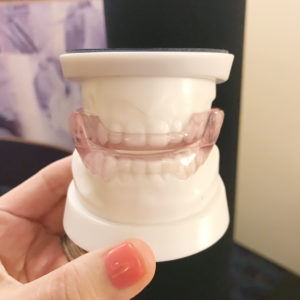DOES SNORING AFFECT YOUR LIFE?
If you or someone you love snores, you are just one of the more than 40% of adults that snore! Snoring increases with age and weight and this usually bothers the bed partner more than the snorer! Snoring is simply the sound of a partially obstructed airway during sleep. Snoring by itself is harmless. However, it can be a sign of a very serious medical condition of obstructive sleep apnea.
TEETH GRINDING (BRUXISM) AND TMJ
Most people who grind their teeth do so at night while they sleep. Many times, this is directly related to having Obstructive sleep apnea (OSA). Teeth grinding is the brain’s way of moving the jaw forward to open the airway so you can breathe. Bruxism and teeth grinding result in broken teeth, pain, failure of
dental work, headaches, TMJ, and neck pain. Orofacial pain, OSA, and teeth grinding often occur together. Does this sound like you?
Obstructive Sleep Apnea happens during sleep when the tongue and soft palate falls back to the throat and completely blocks the airway. This shuts off oxygen intake and you can not breathe. Your sleep is then interrupted many times during the night resulting in a poor night’s sleep. People with OSA are constantly tired, fall asleep easily during the day, usually in the afternoon. Some are irritable and have a tough time concentrating exhibit impotency, and sexual dysfunction, and can have bad breath.
It is estimated that OSA affects up to 40 million Americans with less than 10% of OSA sufferers diagnosed. Obstructive sleep apnea can triple the stroke risk in men and 50% of patients with OSA have hypertension, increasing the risk of heart attacks. Untreated OSA can take up to 12 years off your life and increases the risk of death by 46% which makes it more dangerous than smoking!
WHO GETS OSA?
1 In 5 adults have mild OSA and 1 in 15 adults have moderate to severe OSA. Risk factors which increase your chance of OSA including weight gain, BMI greater than 30 , neck circumference equal to or greater than 15” in women and 17” in men, smoking, mouth breathing and systemic problems like diabetes, stroke, heart attack and hypertension.
TREATMENTS FOR OSA, SNORING, AND BRUXISM
Depending on the severity of OSA treatment options include oral appliance therapy, CPAP, and surgery. There are benefits and risks associated with any treatment and it is important to discuss which option may be best for you depending on your condition. Any of these treatment options are best optimized
when accompanied by lifestyle changes such as good sleep hygiene and weight loss.
ORAL APPLIANCE THERAPY FOR OSA
 Oral appliances are custom-fitted mouthguards specifically manufactured for you. It is best indicated for people who snore, have mild to moderate OSA are CPAP intolerant, grind their teeth, and have TMJ and facial pain. Dentists with training in oral appliance therapy are familiar with the various designs of
Oral appliances are custom-fitted mouthguards specifically manufactured for you. It is best indicated for people who snore, have mild to moderate OSA are CPAP intolerant, grind their teeth, and have TMJ and facial pain. Dentists with training in oral appliance therapy are familiar with the various designs of
appliances. They can determine which one is best suited for your specific needs. Oral appliances have several advantages. Comfortable, easy to wear, portable, and non-invasive are some attributes.

